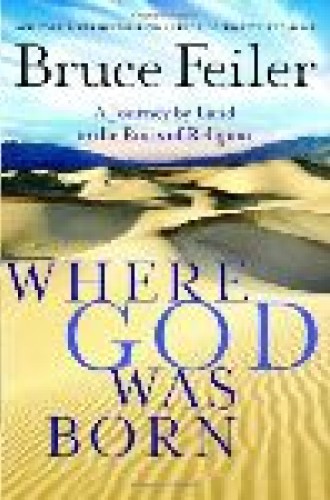Where God Was Born
Near the end of Where God Was Born, Bruce Feiler and his wife, Linda, are sitting in an obliterated Jewish cemetery in Hamadan, Iran, reading to each other from the book of Esther. As Linda makes observations about the Hebrew Bible’s insights into the abusive nature of power, the conversation begins to drift to a discussion of current Israeli policies toward West Bank Palestinians. The two Americans suddenly catch themselves and steer the conversation back to the safer ground of ancient politics. In a book that boldly explores connections between past and present, some connections appear to be off limits.
Where God Was Born is a captivating Middle Eastern journey—one part chronicle of travel in the midst of current conflicts, one part archaeological detective story, one part spiritual quest for meaning and identity. This triple journey uncovers common ground within a triple heritage—the Abrahamic faiths of Judaism, Christianity and Islam. A Jewish American who grew up in Savannah, Georgia, Feiler has been carving out a distinctive publishing niche for himself, beginning with Walking the Bible (2001), which was made into a PBS miniseries, and continuing with Abraham (2002).
Undertaking a 10,000-mile Middle Eastern journey in wartime is no small feat. The itinerary was carefully planned to correspond to stories and characters from Joshua to the Maccabees.
Feiler’s adventures begin with a breathtaking helicopter ride over Israel/Palestine to trace the topography and chronology of Joshua’s conquest of Canaan. The author then visits the West Bank town of Bethlehem; explores the 3,000-year-old water system beneath Jerusalem; circles the Temple Mount on foot; flies into Iraq on a U.S. military transport plane; takes a risky drive south to the marsh country and ancient Sumerian ruins of southern Iraq; reflects on the meaning of the exile amid the ruins of Babylon; interviews Paul Bremer and the last rabbi of the dwindling Jewish community in Baghdad; motors north through the dangerous Sunni triangle to visit the ruins of Nimrud and Nineveh near Mosul; flies into Iran with his wife for visits to several cities there; then comes full circle to the Mount of Olives in Jerusalem.
With a sharp eye for detail and a knack for making scenes and conversations come alive, Feiler shifts back and forth between biblical text and personal anecdote, demonstrating a solid grasp of historical and geographical context—thanks in particular to the guidance of Israeli archaeologist Avner Goren. The Middle East is the perfect place to illustrate the ancient truth that geography is the mother of history. Israel is indeed “the world’s greatest hallway,” while “Mesopotamia hovers between desert and swamp.”
Where God Was Born boldly challenges conventional wisdom and poses provocative questions ranging from the mundane to the universal: Might David have been a Philistine bandit? Did he gain entrance to Jerusalem by way of its sewers? Was Cyrus the Great the Bible’s first messiah? Were the Maccabees freedom fighters or terrorists? What does it mean to be a Jew? Can people of diverse faiths get along? What narratives should we tell our children? When faced with evil, how can we respond with compassion rather than violence? Is there a language that can unify rather than divide and alienate?
The author’s goals are laudable, even inspiring: tolerance, moderation, equality and truth, and the rejection of exclusivity, violence, hatred and revenge—values articulated by the often overlooked Hebrew prophets of the exile period, who, under Persian influence, formulated an increasingly cosmopolitan faith around a belief in a universal God and an affirmation that every human being is created in God’s image.
Unfortunately, the book fails at times to live up to its author’s lofty ideals, and Feiler sometimes fails to find words that unify rather than divide. A case in point is the use of Yom Kippur War to refer to the 1973 Arab-Israeli War, also known as the October War. The author appears unaware of the contradiction between his call for humility and his adoring profile of the triumphalist Israeli war hero whom he invites on his opening helicopter ride: the Israeli is “bursting with pride, a little boy with a train set he had built himself.” Is Feiler aware of how offended his Palestinian Christian guide, who describes herself as “living in a cage,” must feel when a privileged American writer with a comfortable New York home writes “I had come home” to describe his arrival in East Jerusalem? Does the author not see a connection between the growing numbers of Palestinian Christians seeking “better opportunities abroad” and the daily reality of military occupation, bypass roads, settlement expansion and home demolitions?
The author’s uncritical acceptance of the U.S. government’s rationale for the war in Iraq is also evident, though not surprising given his reliance on the U.S. military for transport and security. Had Feiler made contact with Christian Peacemaker Teams in Baghdad, he would have encountered people of courage and deep religious faith seeking to live out the spirit of tolerance, cultural respect and reconciliation that he affirms as central to the Abrahamic faiths. He would also have gained a more nuanced picture of the lives of ordinary Iraqis in the chaotic frontier zone.
Despite its shortcomings, Where God Was Born makes an important contribution to an urgent global question: Is there a place where faith and tolerance can live side by side? Let us hope that the book will be widely read and discussed—and viewed with a critical eye.






